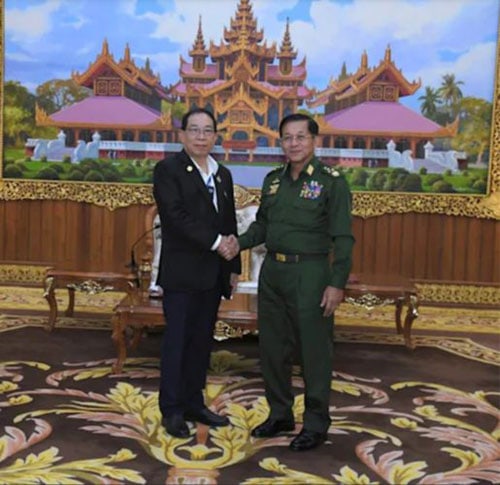The head of Myanmar’s military government held the first in a monthlong series of person-to-person peace talks he has initiated with the country’s his-torically restive ethnic minority groups, state media reported.
Senior Gen. Min Aung Hlaing held discussions with Yawd Serk, chairman of the Restoration Coun-cil of Shan State and Shan State Army, the political body and its military wing representing the Shan minority from eastern Myanmar, state-run MRTV television reported.
Min Aung Hlaing’s meetings in the capital, Naypyitaw, with the leaders of the ethnic armed organizations are their first face-to-face peace talks since the military seized power in February last year from the elected government of Aung San Suu Kyi.
Massive opposition to the army’s takeover has evolved into what some U.N. experts characterize as a civil war. The new armed rebel groups opposed to the takeover have allied themselves with some of the major ethnic minority guerrilla organizations, stretching the military’s resources. Offering generous peace terms to the ethnic groups could shake the anti-government alliances.
The Shan, the country’s largest ethnic minority group, and other minorities have been seeking greater autonomy from the central government since the country, then named Burma, became independent from Britain in 1948.
For most of them, the struggle has included years of armed combat, punctuated by insecure cease-fires. The failure to resolve the issue with a comprehensive political agreement with the government has been responsible for much of Myanmar’s instability, with its army justifying its political influence with the need to safeguard national security.
Bids by the ruling military council for peace talks since last year had failed, so Min Aung Hlaing last month proposed in-person peace talks to the leaders of all ethnic armed groups to negotiate an end to armed conflict across the country. He said the peace talks are for the benefit of Myanmar’s people “to enjoy the essence of peace and development”
Myanmar has 21 ethnic armed organizations, 10 of which accepted the invitation to the peace talks, the military council’s spokesperson, Maj.-Gen. Zaw Min Tun, said at a news conference on Thursday.
But there is skepticism that the talks will do much to advance peacemaking, because none of the groups attending is currently in armed conflict with the government.
The major ethnic minority groups fighting with the army, such as Kachin Independence Army in the north, Karen National Union in the south, the Karenni National Progressive Party in the east and the Chin National Front in the northwest, have spurned the peace talks because the army excluded their allies in the groups formed last year in opposition to its seizure of power.
The opposition National Unity Government and its armed affiliates, called the People’s Defense Forces, have received critical support from ethnic guerrilla groups, including training, weapons and refuge.
Min Aung Hlaing has urged the ethnic militias not to support the groups opposed to army rule, which his administration has designated as terrorists. He also said he will not talk with the National Unity Government and People’s Defense Forces, which he said his army would “annihilate.”
Military spokesperson Zaw Min Tun said in the peace talks, Min Aung Hlaing would ask the aspira-tions of each ethnic minority group, make known the government’s desires and discuss future plans.
“We will have discussions honestly and openly. It is hoped that the meetings will be able to find a solution for the peace process or get a positive out-come for the continuity of peace processes,” he said.
MRTV reported that Min Aung Hlaing’s talks with Yawd Serk covered the practice of multiparty democracy, the establishment of a union system based on democracy and federalism, and peace processes.
Yawd Serk suggested that Min Aung Hlaing prepare a time frame for the peace process after meeting with all ethnic armed groups, MRTV re-ported. It said Yawd Serk would hold talks Saturday with the peace negotiating committees formed by the military council.—AP










